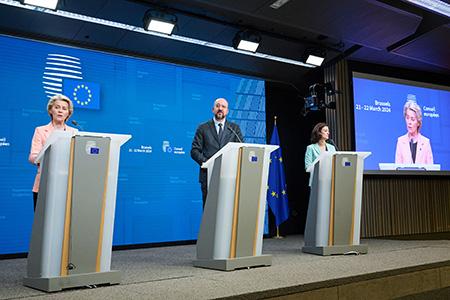
Let me start with Ukraine and the consequences of Russia's war of aggression. We continue very clearly to stand by Ukraine, as we have pledged. Our EUR 4.5 billion payment this week is the first from the Ukraine Fund and further proof of this resolve. I want to focus on three topics that we discussed today.
The first is that we must continue to support Ukraine's efforts to fight back on the battlefield. So I am glad that Leaders endorsed our proposal to use the extraordinary revenues from immobilised Russian assets. This will provide funding for military equipment to Ukraine. We can expect to collect around EUR 3 billion for 2024 and similar amounts in the future years. And I am very grateful to Czechia for its initiative to provide 800,000 shells to Ukraine, with its partners. The funding could also go to this initiative.
My second point is completely different. It is on Russian grain. We have prepared a proposal to increase tariffs on Russian and Belarusian imports of cereals, oil seeds and derived products. And there are several good reasons for making this proposal. It will prevent Russian grain from destabilising the EU market in these products. It will stop Russia from using the revenues from the export of these goods to the European Union. And it will ensure that illegal Russian exports of stolen Ukrainian grain do not enter the EU market.
My third topic is on our own defence. Russia's war of aggression in Ukraine has also given us a new awareness and a new responsibility. In reaction, Member States have already spent EUR 100 billion more on defence, and that is good. But we have to strengthen Europe's defence industrial base. The fragmentation of the European defence market has hindered us from capitalising on our Single Market offers. We do not only need to spend more, we need to spend better and we need to spend European. This is what our European Industrial Defence Strategy that the Commission tabled two weeks ago is all about. It was welcomed by the Leaders to ramp up production, to bridge capability gaps and to spend better together by cooperating on projects and procuring more, together. The benefits of implementing the Strategy are very clear. It can improve the interoperability of our armed forces. We can also have a real return on investments right here in Europe – that is good jobs here in Europe. And finally, European SMEs and mid-caps that are active in the defence sector can grow and access new markets.
In addition, we need to strengthen our general preparedness. Finland is a leader in that, and we have a lot to learn from them. And therefore, I am happy that the former President, Sauli Niinistö, will write a report on the way forward in this area. This report will be drafted in close cooperation with the HR/VP and with the Member States. That was on Ukraine.
Let me now turn to enlargement. I welcome the Leaders' historic decision to open accession negotiations with Bosnia and Herzegovina. The country has taken impressive steps towards our Union. More progress has been achieved in just over a year than in over a decade. Bosnia and Herzegovina is now fully aligned with our Foreign and Security Policy. We have also seen sustained progress on the adoption of important laws. We have seen progress on migration management, and Bosnia and Herzegovina has made great strides on dialogue and reconciliation. So I hope that the decision of today will lead to even more progress.
My final point concerns Gaza. The consensus of tonight is that we need an immediate humanitarian pause leading to a sustained ceasefire, the unconditional release of hostages and the provision of humanitarian assistance. Gaza is on the verge of famine – a catastrophic humanitarian situation. Full, rapid, safe and unhindered humanitarian access into Gaza via all routes is essential. 500 trucks or equivalent a day need to enter into Gaza on land, air and sea. The European Council specifically endorsed the maritime corridor from Cyprus to Gaza to deliver additional volumes. And we urge the Israeli government not to undertake a ground operation in Rafah. Finally, the European Council reiterated that we are firmly committed to a lasting and sustainable peace based on the two-state solution.
Thank you.
Related media
Details
- Publication date
- 22 March 2024
- Author
- Directorate-General for Neighbourhood and Enlargement Negotiations
